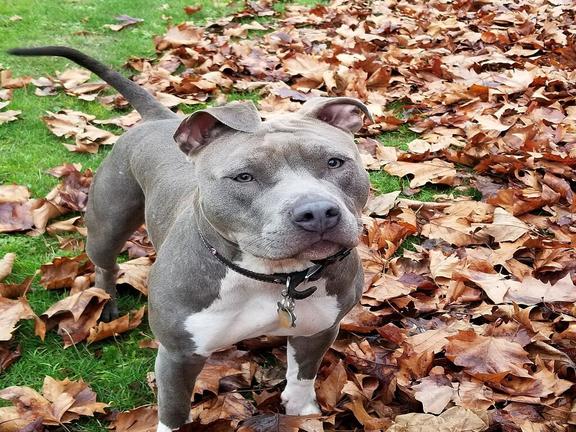The Blue Nose Pitbull is a striking variation of the American Pit Bull Terrier breed, known for its unique blue-gray coat and nose. While often misunderstood, these dogs are affectionate, loyal companions with a playful and energetic demeanor.
Whether you’re considering adopting, purchasing, or learning more about Blue Nose Pitbull puppies, this detailed guide covers everything you need to know.
The Blue Nose Pitbull is a rare and highly sought-after version of the American Pit Bull Terrier (APBT). They are known for its distinctive blue-gray nose and matching coat, this breed is intelligent, affectionate, and athletic.
Blue Nose Pitbulls are excellent family dogs when properly trained and socialized, despite misconceptions surrounding the breed.
Table of Contents
ToggleWhat Makes This Breed Unique?
The primary trait that sets Blue Nose Pitbulls apart is their blue-gray nose and coat, caused by a recessive gene. This rare genetic trait makes them highly valued among dog lovers and breeders.
Furthermore, their striking appearance, combined with their energetic yet loving temperament, makes them a standout among Pitbull variations.
History and Origin
Blue Nose Pitbulls share their ancestry with the American Pit Bull Terrier, a breed developed in the British Isles during the 19th century. Bred from a mix of bulldogs and terriers, Pitbulls were initially used in bull-baiting and other blood sports.
Once these cruel practices were banned, Pitbulls became beloved family companions and working dogs known for their loyalty and strength. Today, Blue Nose Pitbulls excel in roles such as therapy dogs, search-and-rescue animals, and loyal household pets.
Physical Characteristics
| Trait | Details |
|---|---|
| Size | Medium (18-21 inches tall) |
| Weight | 30-60 lbs |
| Lifespan | 12-16 years |
| Coat | Short, smooth, and stiff |
| Color | Blue-gray with white markings |
| Eyes | Blue or grayish tones |
| Nose | Distinctive blue-gray hue |
Their muscular build, strong jaws, and athletic frame give them a powerful yet graceful appearance. Despite their tough exterior, they are loving and loyal dogs.
Temperament and Personality
Contrary to their reputation, Blue Nose Pitbulls are naturally affectionate, playful, and loyal. Here are key traits that define their personality:
- Family-Friendly: Great with children when properly trained and supervised.
- Energetic: Requires daily exercise to stay happy and healthy.
- People-Oriented: Loves human interaction and thrives on companionship.
- Protective: Naturally protective of their family but not inherently aggressive.
With the right training and socialization, Blue Nose Pitbulls make excellent family pets and are known for their deep bond with their owners.
How to Care for This Breed
Diet and Nutrition
A high-protein diet is essential for maintaining their muscular build and energy levels. Feed puppies 3-4 small meals daily and transition to 2 meals as they grow into adults. Ensure their food includes:
- Lean protein: Chicken, beef, or salmon
- Healthy fats: Omega-3 for a shiny coat
- Vitamins and minerals: Essential for bone and muscle health
Avoid overfeeding, as Pitbulls are prone to obesity.
Exercise Requirements
Blue Nose Pitbulls are high-energy dogs that require 60-90 minutes of exercise daily. Activities to keep them stimulated include:
- Long walks or runs
- Interactive play sessions (fetch, tug-of-war)
- Agility training and mental challenges
A fenced yard is ideal for off-leash playtime.
Grooming Tips
Blue Nose Pitbulls have low-maintenance coats, but proper grooming is still necessary:
- Brush weekly to minimize shedding.
- Bathe monthly or as needed.
- Clean ears regularly to prevent infections.
- Trim nails every few weeks.
- Brush teeth 2-3 times a week for oral health.
Common Health Issues
Due to their small gene pool, Blue Nose Pitbulls are prone to certain genetic conditions:
- Hip Dysplasia: A common joint issue in medium-to-large breeds.
- Skin Allergies: Prone to rashes and irritation.
- Heart Disease: Regular vet check-ups are essential.
- Immune System Disorders: Monitor their health and diet.
Early detection and regular veterinary visits can help manage these health concerns effectively.
Training Blue Nose Pitbull Puppies
Early training and socialization are critical for Blue Nose Pitbull puppies. Here are some key tips:
- Start leash training and basic commands (sit, stay, come) early.
- Use positive reinforcement with treats and praise.
- Introduce them to various people, pets, and environments for socialization.
- Provide mental stimulation to prevent boredom and destructive behaviors.
Price of Blue Nose Pitbull Puppies
The price of Blue Nose Pitbull puppies typically ranges between $1,000 to $3,000, depending on factors such as:
- Breeder reputation
- Puppy lineage and health screenings
- Geographic location
Always ensure you purchase from a reputable breeder to avoid unethical breeding practices that can cause health issues.
Adoption vs. Buying from Breeders
- Adoption: Many rescue organizations have Blue Nose Pitbulls in need of loving homes. Adoption fees are more affordable, ranging from $100 to $500.
- Buying: Purchasing from ethical breeders ensures you receive a healthy puppy, but costs are higher.
Whichever route you choose, prioritize the dog’s welfare and health.
Frequently Asked Questions (FAQs)
1. Why are Blue Nose Pitbulls rare?
Their blue-gray nose results from recessive genes, making them less common than other Pitbull types.
2. Are Blue Nose Pitbulls aggressive?
No, they are naturally affectionate but need proper training and socialization.
3. How long do Blue Nose Pitbulls live?
With good care, they can live between 12-16 years.
4. Do Blue Nose Pitbulls require a lot of exercise?
Yes, they need daily exercise to stay physically and mentally healthy.
5. How much do Blue Nose Pitbull puppies cost?
They typically cost between $1,000 and $3,000.
Conclusion
They are a rare and beautiful breed, offering unmatched loyalty, energy, and affection. With proper training, care, and socialization, they make excellent companions for active families. Whether adopting or buying, understanding their needs is key to raising a happy and healthy dog.
For more expert advice on caring for Blue Nose Pitbulls, visit reputable resources like the American Pit Bull Terrier Club and local rescue organizations.






